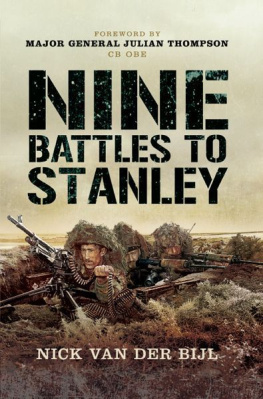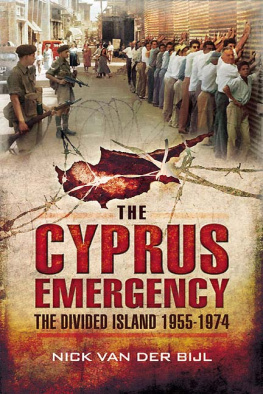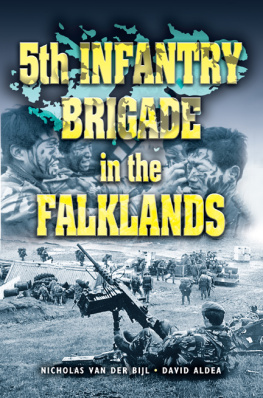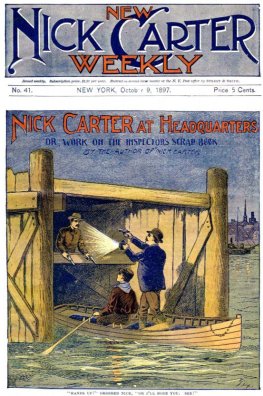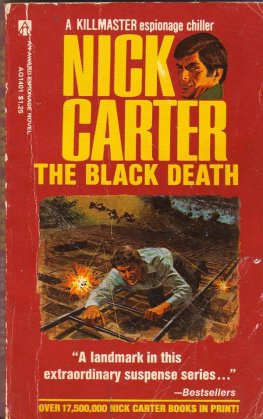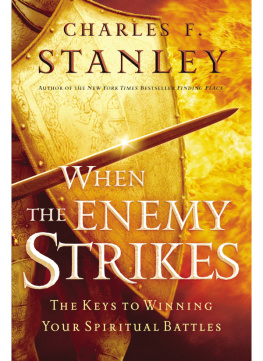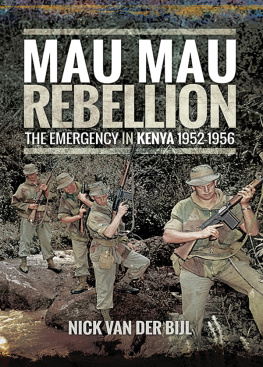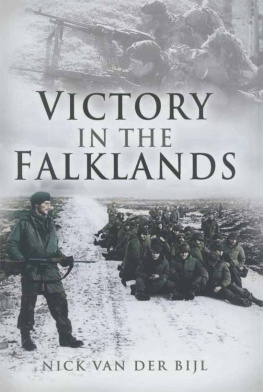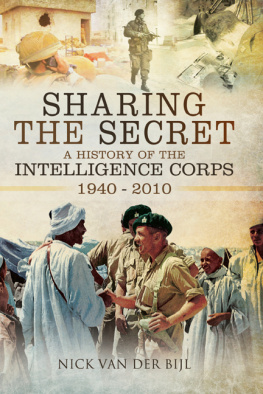First published in Great Britain in 1999 by
Leo Cooper
Reprinted in this format in 2014 by
Pen & Sword Military
An imprint of
Pen & Sword Books Ltd
47 Church Street
Barnsley
South Yorkshire
S70 2AS
Copyright Nick van der Bijl, 1999, 2014
ISBN: 978 1 78159 377 6
EPUB ISBN: 978 1 47381 677 0
PRC ISBN: 978 1 47380 711 2
The right of Nick van der Bijl to be identified as Author of this work has been
asserted by him in accordance with the Copyright, Designs and Patents Act 1988.
A CIP catalogue record for this book is
available from the British Library
All rights reserved. No part of this book may be reproduced or transmitted in any
form or by any means, electronic or mechanical including photocopying, recording
or by any information storage and retrieval system, without permission from the
Publisher in writing.
Typeset in 10/12pt Sabon by
Phoenix Typesetting, Auldgirth, Dumfriesshire
Printed and bound in England
By Page Bros Ltd, Norwich
Pen & Sword Books Ltd incorporates the Imprints of Pen & Sword Aviation,
Pen & Sword Family History, Pen & Sword Maritime, Pen & Sword Military,
Pen & Sword Discovery, Pen & Sword Politics, Pen & Sword Atlas,
Pen & Sword Archaeology, Wharncliffe Local History, Wharncliffe True Crime,
Wharncliffe Transport, Pen & Sword Select, Pen & Sword Military Classics,
Leo Cooper, The Praetorian Press, Claymore Press, Remember When,
Seaforth Publishing and Frontline Publishing
For a complete list of Pen & Sword titles please contact
PEN & SWORD BOOKS LIMITED
47 Church Street, Barnsley, South Yorkshire, S70 2AS, England
E-mail:
Website: www.pen-and-sword.co.uk
TO PENNY AND IMOGEN
Contents
Maps
Foreword
by
Major General Julian Thompson, CB, OBE
Intelligence is a vital commodity to any commander engaged in war. Of course good intelligence work also forms the basis of all successful antiterrorist and counter-insurgency operations, or, to give them the current vogue name, operations other than war. Gathering and assessing strategic and other forms of high-level intelligence continues in peacetime. But, in the British Army and Royal Marines, intelligence at the tactical and operational level is hardly ever played realistically in the peacetime exercises which are supposed to be rehearsals for a real war. The troops must be put through their paces in the all-too-short time available, so the commanders and staff are spoon-fed with information on which to base their plans, and the intelligence sections get little opportunity to practise the painstaking skills involved in collecting and collating the snippets of information which go to make up the intelligence picture in a real war situation, and disseminating it. The collection of intelligence, of course, includes the art of prisoner interrogation. False lessons are learned on exercises. The intelligence staffs fall prey to succeeding rounds of defence cuts, and when a proper war comes along there is a great deal of hurried reinventing the wheel.
Nine Battles to Stanley is an account of the fighting on land in the Falklands War of 1982 by Nick van der Bijl who was the sole Intelligence Corps representative on the staff of my brigade, 3rd Commando Brigade. His post was all that remained after a Whitehall decision ten years earlier had removed the professional intelligence staff just as I arrived as Brigade Major (Chief of Staff) of this Brigade.
Nick van der Bijl tells a fascinating tale as a result not only of being at the centre of events, or thereabouts, throughout the war, and the run-up to it, but also because he has thoroughly researched the Argentine side, and has revealed some hitherto unknown (to the British anyway) facts. He is extremely modest in the telling. Little of the tremendous efforts he had made to overcome years of playing at intelligence on exercises is included. He was fortunate in having a talented team, albeit none of them intelligence personnel by profession, and a highly experienced, battle-wise boss, Captain Viv Rowe, Royal Marines.
I can not resist a wry smile when I remember the efforts needed to persuade the Royal Navy to spare sufficient space in which to allow the Intelligence Section to work as we sailed south to battle. The compartment originally allocated was no larger than a couple of decent-sized built-in cupboards quite enough to assemble the predigested intelligence pap handed out on the exercises which constituted the sole operational experience of all but the most senior naval officers in 1982, Commodore Clapp excepted. The information collaged by my Intelligence Section during the voyage south quickly convinced any doubters among the Navy of the worth of giving them adequate quarters in which to work. Soon they demanded that room be found for their own staff reassigned from other duties or hurriedly flown-in from the United Kingdom to work on naval intelligence. The naval staffs were in an even worse state regarding trained intelligence personnel than my headquarters; at the start of the war they had none.
Nicks fascinating book pulls no punches and is one of the best assessments of the Argentine Army I have read. After the war someone in my Brigade described the Argentine Army as military pygmies. This is probably fair; they were about on a par with the Italian Army at its best in the Second World War. This was not, of course, the fault of the soldiers, nor anything to do with their being Argentine as opposed to British. It was because they were not properly trained and motivated. The blame for those deficiencies must be laid on the senior officers, all the way to the top of their Army.
The Argentines were also militarily nave, again all the way to the top. Their officers and troops wrote and sang what we regarded as childishly jingoistic songs, and expressed sentiments that would have been greeted with jeers by any self-respecting British soldier or marine. This was also not the Argentines fault. The blame again lay with Argentine senior officers, like the one that boasted that he would be proud if his son died fighting for the Malvinas. They failed to prepare their troops, perhaps because they had no national memory of war and what it entails, and certainly no practical experience. They were up against soldiers and marines whose fathers, grandfathers and great-grandfathers had fought in two world wars, and whose army had been fighting non-stop since 1945, except for one year, 1968. Some of the fighting had been small beer, some of it, like Korea, Suez, the Radfan and Dhofar had not. Most of the British soldiers and marines who fought in the Falklands had served in Northern Ireland. Many had experienced the crack and thump of incoming fire. Few had any illusions.
Experience, however, is not enough. One US Secretary of State for War is supposed to have remarked, Frederick the Great had a mule that went on twenty-seven campaigns with him. After twenty-seven campaigns it still remained a mule. Good training combined with experience proved a winning combination for the British in the Falklands. Lack of either did for the Argentines.
But, as Nick van der Bijl makes clear in this excellent book, intelligence was one area in which the British had a great deal of catching-up to do. Let us hope the lesson has been learned.
Julian Thompson
Glossary
| Advanced Forces | Naval term for Special Forces. In the context of this book, the SAS, SBS and Mountain and Arctic Warfare Cadre RM. |
| AML 90 |


